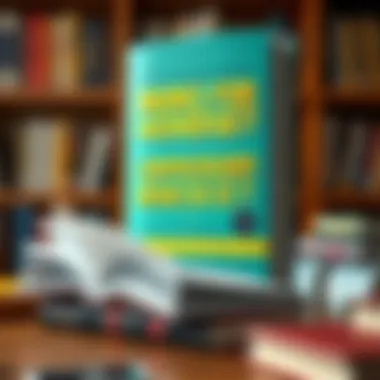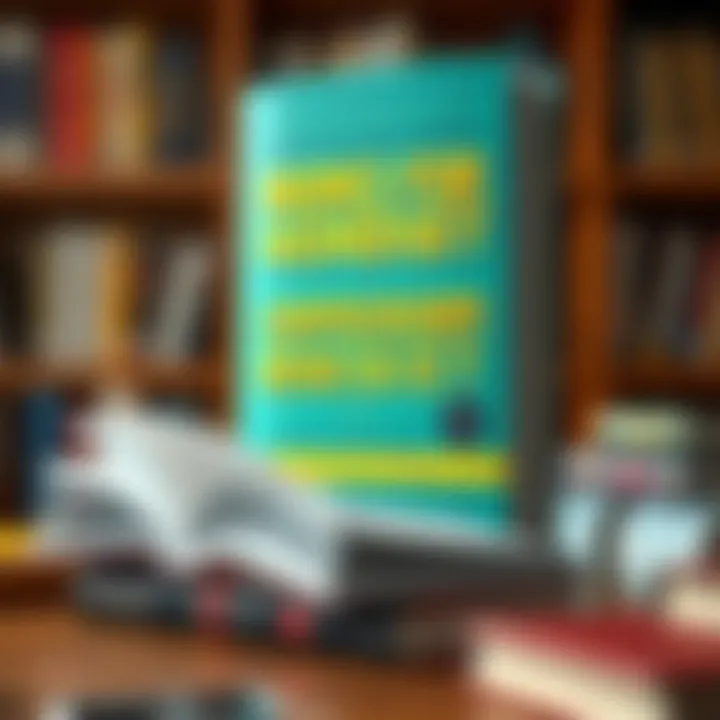Books That Transform Mindsets for Personal Growth


Intro
In today's fast-paced world, many individuals seek out ways to shift their thinking and adapt to change. Often, the catalyst for such profound transformation can be found within the pages of a book. Literature not only entertains but also challenges our viewpoints and inspires personal growth. The right book can open doors to new ideas, helping us reshape our perspectives and step outside our comfort zones.
This guide explores various categories of literature that empower readers to shift mindsets. It encompasses various genres, including fictional tales with rich characters that mirror our own struggles, as well as self-help texts that offer practical advice for transformational change. By understanding how targeted literature affects our subconscious beliefs and encourages growth, we can more effectively harness the potential of reading to reshape our inner narratives.
Book Categories
Literature can be broadly divided into two categories that play significant roles in transforming mindsets:
Fiction and Literature
Fiction provides a unique lens through which we can view the world. Novels and stories allow readers to experience life from the perspective of others, fostering empathy and understanding. When we connect with characters facing challenges, it becomes easier to reflect on our own lives. For instance, a novel about resilience might inspire us to persevere through our difficulties.
Some noteworthy works include:
- "The Alchemist" by Paulo Coelho: A tale of self-discovery and pursuing one’s dreams.
- "To Kill a Mockingbird" by Harper Lee: A poignant examination of human behavior and morality.
- "The Road" by Cormac McCarthy: A stark portrayal of survival and paternal love in a post-apocalyptic world.
These stories create windows into lives different from our own, pushing us to question preconceived notions.
Self-Help and Personal Development
Self-help books focus directly on encouraging personal growth and shifting mindsets. They offer practical strategies for overcoming difficulties and achieving goals. Through clear frameworks and actionable advice, these texts can be invaluable in guiding readers towards a more productive and fulfilled life.
Examples of impactful self-help literature include:
- "Mindset: The New Psychology of Success" by Carol S. Dweck: This book delves into the importance of a growth mindset versus a fixed mindset.
- "Atomic Habits" by James Clear: This work provides simple methods for building positive habits and breaking negative ones.
- "The Power of Now" by Eckhart Tolle: A transformational book about mindfulness and living in the present.
These self-help resources can help demystify the process of transformation, outlining steps that readers can take toward their goals.
Book Summaries
To maximize the impact of these readings, it’s crucial to delve into their insights and takeaways.
Key Insights and Takeaways
Books often harbor essential ideas that resonate deeply with readers. For instance, in "Mindset," Carol Dweck emphasizes that individuals with a growth mindset — the belief that skills and intelligence can be developed — tend to achieve more than those with a fixed mindset. This simple shift in perception can influence a person’s academic and professional success.
Likewise, in "Atomic Habits," James Clear discusses the importance of small changes leading to notable results. The message revolves around the cumulative power of consistent, minor adjustments.
How to Apply the Lessons
Reading such insightful texts is merely the first step; applying the lessons learned is where the real change happens. Here are a few strategies to implement the insights garnered from these readings:
- Keep a Journal: Reflect on your thoughts after reading, noting how they apply to your life.
- Set Specific Goals: Use concepts from "Atomic Habits" to outline manageable steps toward a larger objective.
- Engage in Discussions: Talk about these books with peers or online communities like those found on reddit.com, as conversing about ideas stimulates deeper understanding.
These practical steps lead not only to knowledge retention but also to genuine personal transformation.
"Books are a uniquely portable magic." - Stephen King
Literature acts as a bridge to personal growth and mindset changes that are sustainable and profound. By exploring these categories and implementing lessons from significant works, individuals can embrace the potential for change as they expand their horizons through reading.
Understanding Mindset
Understanding mindset is like peeling back the layers of an onion – the deeper you go, the more nuanced the understanding becomes. Our mindset shapes how we interpret the world and influences our actions. It amalgamates beliefs, experiences, and reactions. The significance of mindset is particularly pertinent in the context of personal growth, self-improvement, and adaptation to life’s challenges. When individuals cultivate an understanding of their mindset, they arm themselves with the ability to change it.
One benefit of grasping the concept of mindset is becoming aware of fixed versus growth mindsets. A fixed mindset locks one into a rigid framework where abilities are seen as static. Conversely, a growth mindset opens up the pathways to potential and change, fostering resilience and agility. This flexibility leads to innovation in thinking, driving individuals to explore new opportunities.
Considerations about mindset shouldn’t be taken lightly. Cultivating awareness of one’s own mindset involves introspection, which can be uncomfortable and challenging. Yet, acknowledging different thought patterns is a requirement for growth and progress. It’s not merely a stroll in the park; it’s about facing one’s fears and skewed beliefs head-on. The exploration of mindset also prompts individuals to confront societal labels and stereotypes that can hinder growth.
"Your mindset is your window to the world. Change your mindset, and you’ll change your view of the entire world."
Thus, understanding and shaping mindset is crucial in the journey of personal development. It’s a stepping stone towards enlightenment and resilience. As literature has the power to facilitate such understanding, we can see how books can serve as the catalyst for transitioning from an obsolete mindset to one that embraces growth and transformation.
Defining Mindset
To dissect what mindset truly is, we must look at it as a collection of beliefs that influence how we interpret our experiences. Mindset encompasses the narratives we tell ourselves about ability, opportunity, and learning. An individual’s mindset shapes the lens through which they view challenges—either as hurdles or stepping stones.
Mindset can lead us down various paths. For instance, a person with a positive mindset likely approaches obstacles with the belief that they can overcome them, drawing from past experiences and lessons. The key here is that mindset is not immutable; it can evolve with experience and effort.
The Role of Mindset in Personal Development


The impact of mindset on personal development is akin to a compass directing one’s journey. A growth mindset, identified by psychologist Carol Dweck, emphasizes the power of perseverance and learning. This viewpoint promotes the belief that abilities can be developed through dedication and hard work. With this understanding, individuals often seek out challenges, viewing failures not as indicators of inadequacy but as valuable lessons.
A positive mindset fuels creativity and innovation, encouraging individuals to pursue their passions and interests. This can lead to heightened emotional intelligence, improved relationships, and an enriched life experience. Conversely, a fixed mindset can result in stagnation, stifling potential and leaving a person feeling trapped in a box.
The Impact of Literature on Mindset
Literature has long been considered a mirror to society, reflecting not only the world we live in but also the inner workings of our minds. Reading, in its myriad forms, has the power to influence our thoughts, beliefs, and ultimately, our actions. The importance of understanding the impact of literature on mindset cannot be overstated, particularly when we consider the transformative journey each individual embarks upon when engaging with texts that resonate.
When one picks up a book, they are not merely immersing themselves in a story. They are often stepping into a new perspective—an invitation to see the world through the eyes of different characters, cultures, and philosophies. This shift in viewpoint can be profound, as it challenges the reader's preconceived notions and nudges them toward new horizons of understanding.
The benefits of literature as a catalyst for mindset change are numerous:
- Diverse Perspectives: Books expose us to various walks of life, instilling empathy and a deeper appreciation for the human experience.
- Critical Thinking: Engaging with complex narratives enhances our analytical skills, prompting us to question our assumptions and evaluate our beliefs.
- Emotional Resonance: Literature can evoke feelings that transcend our everyday lives, allowing for emotional growth and introspection.
It is important to recognize that not all literature will have the same influence on every reader. Individual experiences, background, and context play a crucial role in how we interpret what we read. However, the intrinsic ability of a well-written book to inspire change is a theme that bridges readers from all walks of life.
"A good book is an event in my life." – Stendhal.
Through literature, we often catch glimpses of the struggles and triumphs that come with personal development. Texts that delve into the intricacies of mindset offer guidance, wisdom, and sometimes a wake-up call for readers seeking to better themselves.
In summary, literature is not just an art form; it is a vehicle for change. It shapes our mindsets by pushing boundaries, fostering understanding, and encouraging growth. The interplay between reading and mindset evolution is a rich field worth exploring, as the words of authors can lead us to engage more fully with our own lives and challenge the status quo.
How Books Shape Perspectives
Books play a pivotal role in shaping our perspectives, often serving as a gateway to new ideas and ways of thinking. When we encounter different viewpoints through characters and narratives, we are prone to reassess our beliefs and consider alternative paths.
One way books do this is by introducing readers to unfamiliar worlds. For example, a novel set against the backdrop of a different culture or time can immerse the reader in experiences far removed from their own. This form of escapism, while enjoyable, also forces us to reckon with the reality of diversity in thought and experience.
Consider this:
- Characters often face conflicts that echo our own struggles, offering clarity and connection.
- Narratives can normalize experiences or challenges we might find difficult to articulate, helping us feel less alone in our journeys.
- The storytelling medium allows for emotional connection, which can foster profound changes in how we perceive one another.
Through these explorations, readers often come away with a fresh lens through which to view their lives. They start to see that the hurdles faced by one may reflect in their own encounters, sparking an urge for growth and a shift in mindset.
Narrative as a Tool for Change
Narrative, in its essence, is a powerful tool in transforming mindset. It embodies the core of human experience and allows us to process complex emotions, thoughts, and events in accessible ways.
The structure of a narrative—complete with conflict, resolution, and character development—mirrors the challenges we encounter in our own lives. This resonance can provide powerful lessons in resilience, making us more prepared to tackle similar challenges in reality. For instance:
- Conflict and Resolution: As we witness characters navigating their struggles, we learn about the importance of perseverance and adaptability.
- Character Growth: An individual's journey from a fixed mindset to a growth-oriented one in a story can motivate readers to pursue personal development.
- Relatable Challenges: Books often encapsulate the messy nature of life, helping readers to normalize failure and embrace learning as part of the journey.
In this sense, narrative is not merely for entertainment—it serves as a practical framework for developing a more robust and adaptive mindset. The lessons imbibed from stories and characters can inspire transformative change, encouraging individuals to reconsider what is possible and redefine their paths.
Ultimately, the interplay between literature and mindset is a dynamic one. By embracing the thoughtful lessons and varied perspectives presented in books, readers position themselves to navigate life's complexities with greater clarity and confidence.
Top Books for Changing Mindset
When it comes to shifting one’s perspective and fostering personal growth, the right literature can make a world of difference. Books hold the power to inspire, challenge, and ultimately transform how we see ourselves and the world around us. In this section, we’ll delve into a selection of books that are especially significant for those seeking to change their mindset.
Whether one is grappling with self-doubt, striving for success, or simply seeking deeper understanding, literature offers various pathways through wisdom, insight, and stories that resonate deeply. Below are standout titles in both non-fiction and fiction categories, each chosen for its unique ability to inspire change and promote a growth mindset.
Non-Fiction Works
Think and Grow Rich by Napoleon Hill
This classic work delves into the fundamental principles of success. Hill spent years interviewing the most successful individuals of his time, distilling their insights into key principles that can boost any individual's personal and financial success. Its pivotal idea revolves around the importance of having a definitive goal and keeping a strong, focused mindset.
One key characteristic of Think and Grow Rich is its emphasis on visualization and positive thinking. Readers are encouraged to articulate their desires clearly and to envision achieving them. This focus on clarity and intention is a beneficial feature, allowing readers to develop a pathway toward their goals in an organized manner.
Despite its acclaim, some critics note that Hill's ideas may seem overly idealistic or simplistic, particularly for those facing systemic barriers. Nonetheless, the motivational perspective it offers is indispensable in this guide, as it encourages a focus on personal agency.
The Power of Now by Eckhart Tolle
Tolle’s book is an exploration of mindfulness and the idea that true power lies in the present moment. Many readers have found profound relief from anxiety and stress by applying the concepts laid out in this work, which emphasizes letting go of the past and not overthinking the future.
What makes The Power of Now stand out is Tolle's unique blend of spirituality and practicality. He provides readers with exercises aimed at cultivating presence and awareness in day-to-day life. This can be incredibly advantageous for anyone looking to shift their mindset toward appreciating the current moment rather than dwelling on worry or regret.
However, some may find Tolle's spiritual approach challenging to digest at first. It may require a shift in thinking that doesn’t come easily; thus, patience is necessary when engaging with this text.
Mindset: The New Psychology of Success by Carol S. Dweck
Dweck presents a study of the differing mindsets that can govern how individuals approach challenges. The concept of a fixed versus a growth mindset can radically alter how people confront obstacles in life. A fixed mindset leads to avoidance of challenges, whereas a growth mindset encourages perseverance and learning from failures.


This book is popular for its relatable examples and actionable steps that readers can apply instantly. A significant takeaway is that one can cultivate a growth mindset through conscious effort and reflection, making it a highly valuable read for those looking to change their life direction.
One downside could be that the scientific aspects may feel dense for some readers. Yet, the examples and language Dweck uses generally make her insights accessible to a broad audience.
Fiction with Meaningful Messages
The Alchemist by Paulo Coelho
This novel goes beyond mere storytelling; it encourages readers to pursue their own personal legends, or dreams. Coelho uses the journey of Santiago, a shepherd boy, to illustrate that the pursuit of one’s goals is as important as their attainment.
The key characteristic of The Alchemist is its allegorical depth. Readers are inspired to listen to their hearts, seek out their dreams, and learn from the universe's signs. This sense of adventure and self-discovery is why many consider it a top pick for anyone wanting to change their mindset in a profound way.
While the book is widely cherished, some find its overtly simplistic message to be less impactful. However, it remains a valuable reminder to keep dreaming and searching for one's purpose.
Fahrenheit by Ray Bradbury
Bradbury's dystopian novel serves as a cautionary tale, reinforcing the importance of literature and critical thinking in society. It examines the dangers of censorship and the loss of individual thought amid conformity. This theme serves as a motivation for readers to nourish their minds and question the status quo.
A critical feature of Fahrenheit 451 is its stark imagery and gripping narrative, which allows readers to contemplate the themes of suppression versus the liberating power of knowledge. This is especially essential for anyone looking to broaden their mindset and appreciate the value of independent thought.
The downside to this novel is its heavy tone, which can be daunting for some readers. Nonetheless, its profound messages about knowledge and personal agency are crucial for anyone on a path to change.
The Little Prince by Antoine de Saint-Exupéry
Many label this book a children's story, yet its profound philosophical insights resonate with readers of all ages. It discusses the importance of seeing with the heart and not merely with the eyes, encouraging readers to consider the essence of what matters in life.
The nuanced observations about relationships and what it means to be human make The Little Prince an excellent addition to this guide. Its messages prompt reflection on one’s own mindset and values, fostering change through introspection.
However, some may find its simplicity deceiving, potentially overlooking its deeper themes. Yet, for those who take the time to ponder, it can be a valuable text for personal growth and mindset evolution.
In summary, the books listed in this section encompass a range of ideas focused on changing mindset, making it easier for readers to find titles that resonate personally. The combination of non-fiction and meaningful fiction can help guide individuals toward a fresh perspective and transformative growth.
Key Themes in Transformational Literature
Exploring key themes in transformational literature helps to unpack the significant impact that certain concepts can have on an individual’s mindset. These themes not only reflect common threads across various impactful books but also serve as guiding principles for personal development. Understanding these themes can inspire readers to embody the lessons learned from various narratives, reshaping how they perceive challenges and opportunities in their lives.
Benefits of engaging with these themes are manifold. They foster resilience, enhance self-awareness, and instill a sense of purpose and meaning. When readers identify with a particular theme, it can significantly alter their perspective and approach to personal and societal issues. Moreover, incorporating these lessons into daily life can cultivate a sense of empowerment vital for long-term growth.
Resilience and Overcoming Adversity
Resilience is often touted as a core component of personal growth. Literature provides a mirror to the human experience, allowing readers to resonate with characters who face significant challenges. Stories often depict characters navigating hardships, providing a canvas that illustrates the struggle to bounce back from failure. This theme emphasizes the importance of learning from adversities, reinforcing the message that "what doesn’t kill you makes you stronger."
For instance, consider the narrative in The Alchemist by Paulo Coelho. The protagonist, Santiago, encounters trials in his quest for happiness and fulfillment. His ability to adapt and persist despite numerous setbacks not only compels readers to reflect on their own resilience but also provides practical wisdom on overcoming life’s hurdles.
Each instance of adversity faced by a character mirrors real-life struggles, encouraging readers to embrace their own challenges and transform them into growth opportunities. In essence, literature becomes a rehearsal space for resilience, equipping readers with the frameworks necessary to tackle their personal adversities.
Self-Awareness and Personal Responsibility
Another prevalent theme in transformational literature is self-awareness and personal accountability. The best storytellers invite readers into the minds of their characters, showcasing their inner battles. This insightful glimpse can inspire readers to reflect on their own thoughts and actions, asking themselves, "What role do I play in my life’s script?"
In books like The Power of Now by Eckhart Tolle, the exploration of present-moment awareness unfolds as an integral tool for self-discovery. Tolle’s philosophy encourages readers to step back and realize how often they operate on autopilot, unaware of their thoughts and feelings. This call to awareness ultimately grants individuals the power to take personal responsibility for their decisions and outcomes.
When one becomes more self-aware, it naturally leads to greater accountability. Understanding one’s impact on themselves and the environment fosters a sense of maturity that can ignite lasting change. By owning up to their choices, readers begin to unravel layers of self-deception, potentially pivoting towards a more fulfilling life aligned with their true values.
Purpose and Meaning in Life
The quest for purpose and meaning threads itself through countless narratives, often driving the characters’ actions and influencing their decisions. This theme resonates deeply with readers who might be grappling with their own sense of direction. Whether through a journey of self-discovery or a mission to create a meaningful impact, literature’s portrayal of purpose encourages readers to reflect on their own life goals.
In Mindset: The New Psychology of Success by Carol S. Dweck, the concept of a growth mindset pivots around the idea of believing in one’s potential. It empowers individuals to see challenges as opportunities for growth and to seek out their purpose actively. Dweck’s insights prompt readers to consider not just what they want to achieve but why it matters, thereby aligning their ambitions with deeper personal values.
"Finding purpose is not merely about the end goals; it is also about the journey and the lessons learned along the way."
Engaging with this theme can evoke profound shifts in a reader’s outlook on life. By prioritizing meaning, individuals are more likely to pursue paths that resonate with their core beliefs, ultimately leading to more fulfilling and authentic experiences.
Reading as a Practice for Mindset Change
Reading is not just a pastime; it’s a dynamic avenue for altering one’s mindset. This section underscores the significance of reading as an active practice that goes beyond merely flipping through pages. It engages the mind, fuels creativity, and fosters a deeper understanding of oneself and the world. By cultivating a reading habit, individuals can challenge preconceived notions, broaden their horizons, and ultimately shift their perspectives. The benefits are manifold, encompassing knowledge acquisition, emotional resonance, and cognitive agility.
Building a Reading Habit
Establishing a reading habit is akin to nurturing a healthy plant; it requires consistency and care. Start by carving out time each day dedicated to reading. Even if it’s just 15 minutes, this routine can blossome into longer sessions as you grow more immersed in the material. Here are a few tips to make it stick:
- Set clear goals: Determine how many books you’d like to read monthly or yearly. Breaking down larger targets into manageable bits makes the goal less daunting.
- Create an inviting environment: Designate a comfortable reading space, filled with good lighting, snacks, or your favorite cozy blanket. A space that feels welcoming can greatly enhance your reading sessions.
- Explore various genres: Don’t box yourself in with dull choices. Toss in a mix of fiction, non-fiction, biographies, and even poetry. This variety keeps the experience fresh and caters to different moods.
- Track your progress: Whether using a journal or a digital app, keeping tabs on what you've read provides motivation and a sense of accomplishment.


These steps aren’t just actionable; they’re essential for fostering a consistent reading practice that lays the groundwork for a transformed mindset.
Engaging with Text for Deeper Insights
Reading without engagement can often be like pouring water into a sieve—what’s the point if it just runs through? To truly gain insights from literature, readers should actively interact with the text. Here are strategies to deepen your engagement:
- Annotate while you read: Jot down thoughts, underline impactful sentences, or even doodle in the margins. This active participation makes the reading more personal and memorable. If something strikes a chord, mark it.
- Discuss with others: Share thoughts about the book with friends, family, or join a reading group. Conversations can open new perspectives that you didn’t initially see.
- Reflect on applications: After reading, take a moment to consider how the themes or lessons can be applied to your life. This can range from altering daily habits to tackling broader challenges.
- Revisit key texts: Sometimes, a second or third read reveals layers overlooked in the first pass. Each reading can feel different, akin to watching a film multiple times and catching subtle nuances.
Engaging deeply with literature fosters critical thinking and helps build connections between the material and personal experiences, paving the way for a transformative mindset.
"Reading can be a transformative experience—like cleaning out a cluttered closet, it clears the mind for new ideas and perspectives."
So, whether it’s building a steadfast reading habit or diving deep into a text’s nuances, embracing reading as a serious practice truly lays the foundation for significant mindset shifts.
Summarizing Insights from Influential Books
In the realm of literature, the power of insights derived from influential texts can act as a beacon for those on the journey of mindset transformation. The act of summarizing insights not only crystallizes knowledge gained but also allows readers to navigate complex ideas with clarity. Understanding how to distill key lessons from a book is vital; it ensures that the salient points resonate long after the final page is turned. In this article, we explore the significance of summarizing insights and how it can scaffold personal growth.
How to Extract Key Lessons
Extracting key lessons from a book is akin to mining for gems; it requires patience, attention, and a discerning eye. When approaching a text, consider the following steps:
- Active Reading: Engage with the text by highlighting important passages or jotting down notes in the margins. This interaction helps cement ideas in memory.
- Reflect on Themes: Identify predominant themes or messages. What are the author’s core arguments? How do these ideas connect to your own experiences?
- Summarize Chapters: After each chapter, take a moment to write a brief summary. What did you learn? What questions remain unanswered? This can help in distilling larger concepts into manageable takeaways.
- Discussion with Others: Talking about a book with peers can reinforce understanding and uncover new interpretations that you may not have considered previously.
"Knowledge is power, but understanding is liberation."
Further, do not shy away from revisiting sections that resonated with you. Reading something a second time can yield fresh insights, as you may find that your own perspective has changed.
Applying Lessons to Everyday Life
Once you've extracted valuable lessons from a book, the next crucial step is application. It's one thing to grasp concepts intellectually, but applying these insights is what breathes life into them.
- Set Practical Goals: Take the lessons learned and translate them into actionable goals. For example, if a book emphasizes resilience, consider situations in your life where you can apply that resilience. Write down specific actions you can take, rather than vague intentions.
- Create a Daily Reflection Routine: Set aside time each day to reflect on the lessons. Ask yourself how they manifest in your daily interactions and decisions. This could be through journaling or simply taking a few minutes of quiet contemplation.
- Integrate New Habits: Change seldom happens overnight. Introduce new behaviors gradually. If you learned about mindfulness, start with a five-minute daily practice and increase it as you feel comfortable.
- Share What You've Learned: Sharing insights with others can reinforce your understanding and commitment to applying what you’ve learned. Consider book clubs or online forums where you can discuss and promote accountability.
By weaving the insights gathered from influential books into the fabric of everyday life, one cultivates a responsive mindset that is open to growth and transformation. The process dynamically enhances self-awareness and fuels the progress needed to navigate life’s ups and downs.
Embracing Change through Literature
Literature often serves as a mirror to our experiences, reflecting truths that might remain obscured in daily life. Embracing change through reading allows individuals to break free from the chains of their current mindset. When one immerses themselves in a book, they not only encounter the characters and their journeys but also become part of those very transformations. Through literature, readers are offered not just stories, but blueprints for personal evolution.
The significance of this journey lies in its potential to cultivate resilience, empathy, and self-reflection. For those looking to shift their perspectives, books can be a safe haven of exploration. They provide a platform to confront discomforting realities and challenge established beliefs. Books can illuminate experiences that resonate deeply, inspiring readers to question their preconceptions and embrace new ways of thinking.
Mindfulness and Emotional Growth
Engaging with literature can foster mindfulness, the practice of being fully present and aware. This mindful engagement can lead to significant emotional growth. The act of reading requires focused attention—a state that can draw the mind away from constant distractions of the modern world. When one picks up a book, especially those rich in narrative and emotional depth, they are compelled to connect not just with the characters, but also with their own feelings and thoughts.
The stories unfold layers, revealing the complexity of emotions and intricate human relationships. Take, for instance, The Power of Now by Eckhart Tolle. It invites readers to reflect on their thoughts and feelings, urging them to remain present. Literature such as this can spark profound realizations about one's own emotional state, leading to greater self-awareness. This transformation cultivates a sense of empathy and understanding, which can be carried into real-life interactions. Engaging with characters' struggles can evoke our own feelings, allowing for a kind of emotional catharsis and growth that often leads to more meaningful connections in our own lives.
"Books are a uniquely portable magic." — Stephen King
Developing a Growth Mindset
In a world that seems to rapidly evolve, the ability to adapt is paramount. Developing a growth mindset is essential for those aiming to embrace change, and literature is an invaluable ally in this endeavor. A growth mindset, as discussed by Carol S. Dweck in her book, encourages individuals to view challenges as opportunities for learning and development. Books motivate readers to believe that abilities and intelligence can be cultivated through effort and perseverance.
Through the narratives presented in various literature, readers can see characters face hurdles in their journeys, mirroring their own lives. This sense of relatability can empower individuals to tackle their challenges head-on. Stories like Mindset: The New Psychology of Success lay bare the mechanics of adapting one's thinking, turning obstacles into stepping stones.
While delving into the themes of change, books can also illuminate the idea that failure is not a dead end but rather a part of the learning process. The wisdom embedded in literature propels individuals toward a proactive stance, enabling them to resist the fear of failure that often stymies growth.
Closure and Future Directions
As we draw this exploration to a close, it becomes clear that the journey of reading encompasses far more than just ink on paper. Literature holds an extraordinary potential to transform our mindset, shaping how we view ourselves and the world around us. Engaging with different perspectives through books allows us to challenge preconceived notions, fostering a more flexible and open-minded approach to life. It is within this framework that we find the crux of our discussion on mindset change, where literature serves as both a catalyst and a companion.
Continuing the Journey of Reading
Reading is not merely a pastime; it's a lifelong commitment that can significantly alter our thinking patterns. For instance, creating a reading list tailored to personal development can become a valuable tool in navigating life's challenges. One might start with setting attainable goals, like reading a chapter a day or exploring at least one new genre each month. The beauty lies in the gradual uncovering of insights that these texts provide.
A key aspect of this ongoing reading journey involves reflection. Taking the time to jot down thoughts or feelings about what was read can deepen understanding. This practice also ensures that lessons learned do not fade away amidst the hustle and bustle of daily life. It can be as simple as keeping a journal or even engaging in discussions with others. Sharing insights can lead to richer comprehension, allowing individuals to glean fresh perspectives from fellow readers.
Additionally, integrating books into life routines can help reinforce a mindset geared towards growth. For example, dedicating time during a commute or before bed significantly increases exposure to new ideas. This commitment pays off, as insights from literature age and mature, ultimately influencing personal decisions and interactions.
Exploring New Literature for Personal Development
The literary world is a vast ocean, brimming with resources that can inform and inspire personal growth. As we look to the future, it’s essential to engage proactively with emerging authors and new genres. The literary landscape often reflects societal changes, offering fresh insights that resonate with contemporary challenges.
Continuously seeking new literature can be accomplished through joining book clubs or participating in online platforms like Goodreads. These communities often spotlight lesser-known works, which can provide unique viewpoints that mainstream publications may overlook. Moreover, attending author readings or literary festivals can unveil treasures that might otherwise remain hidden.
"Books are a uniquely portable magic." - Stephen King
With each page turned, we not only discover new realms and ideas but also get to know ourselves better. Here lies the true beauty of reading—an adventure without end, fueled by curiosity and the ever-present possibility of change.



